Monthly Topic Briefs
Updates on current issues and projects.

Endorsing a circular economy approach to waste reduction means moving away from recycling as the answer to managing materials, and moving to reusable items instead of single use and/or recyclable items. Reuse is considered “upcycling,” or extending the life of an item in its same form with minimal processing.
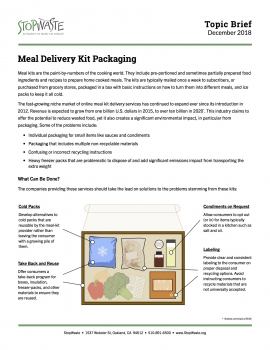
Meal kits include pre-portioned and sometimes partially prepared food ingredients and recipes to prepare home cooked meals. The kits are typically mailed once a week to subscribers, or purchased from grocery stores, packaged in a box with basic instructions on how to turn them into different meals, and ice packs to keep it all cold.
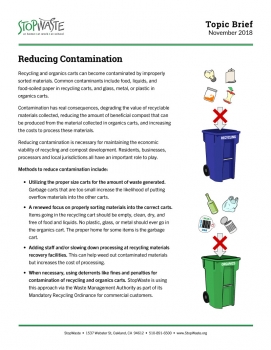
Recycling and organics carts can become contaminated by improperly sorted materials. Common contaminants include food, liquids, and food-soiled paper in recycling carts, and glass, metal, or plastic in organics carts.
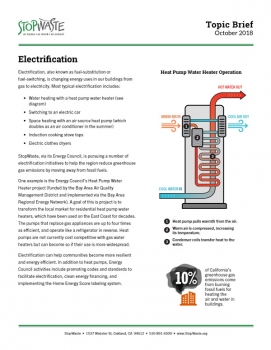
Electrification, also known as fuel-substitution or fuel-switching, is changing energy uses in our buildings from gas to electricity. StopWaste, via its Energy Council, is pursuing a number of electrification initiatives to help the region reduce greenhouse gas emissions by moving away from fossil fuels.
In an effort to mitigate plastic pollution and reduce the amount of single-use plastic, California lawmakers recently passed Assembly Bill (AB) 1884, which bans full-service restaurants from offering single-use plastic straws unless requested by the customer. The law, which will take eff ect January 1, 2019, calls for fines on establishments beginning with the third violation.

The issues related to pollution from single-use plastics are complex and lack a straightforward solution. These items, especially food ware such as cups, lids, straws, utensils, takeout containers, and bags, often end up as litter where they pollute marine environments.

In a linear economy, natural resources are extracted from the environment and transformed into products that are consumed and ultimately disposed as waste.

Residents of Alameda County have multiple free and convenient options for safely disposing of leftover hazardous waste:

The United States, Europe, Australia and other parts of the world have increasingly relied on China as an export destination for mixed paper (junk mail, newsprint, office paper, etc.) and mixed plastic.

Since 1996, StopWaste has provided more than $8 million in funding to local organizations for innovative projects that decrease the amount of waste generated and sent to the county's landfills, and encourage the development, marketing and use of recycled products. The grants program is currently focused on funding waste prevention, reuse and repair projects.
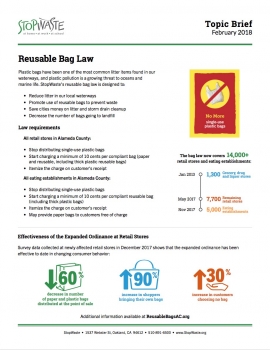
Plastic bags have been one of the most common litter items found in our waterways, and plastic pollution is a growing threat to oceans and marine life. StopWaste’s reusable bag law is designed to:
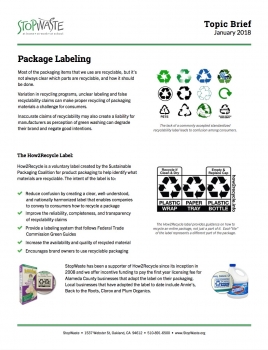
Most of the packaging items that we use are recyclable, but it’s not always clear which parts are recyclable, and how it should be done. Variation in recycling programs, unclear labeling and false recyclability claims can make proper recycling of packaging materials a challenge for consumers.